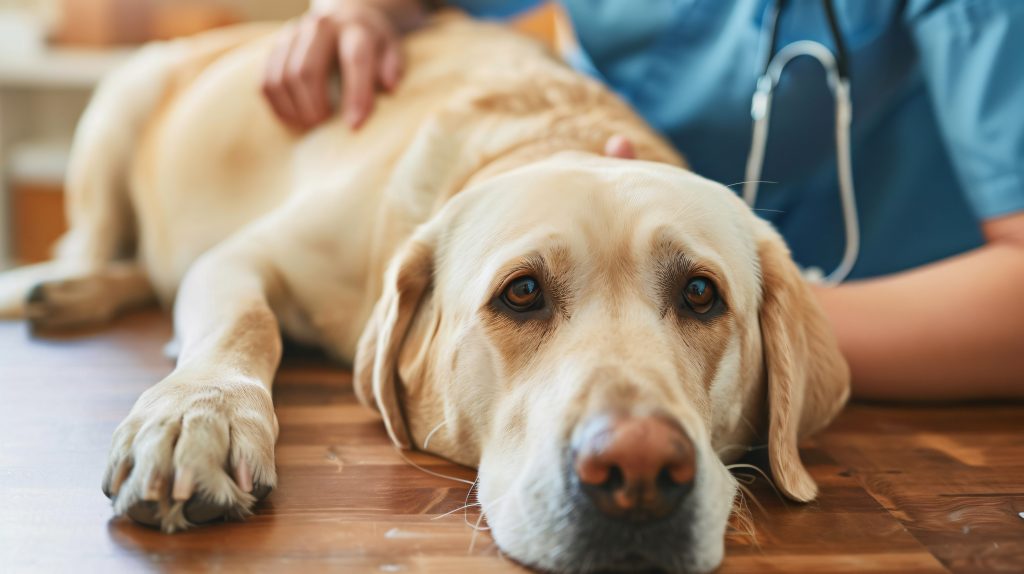Home » Digestive Health in Dogs
In addition to the stomach, the dog’s digestive system includes the mouth, teeth’s, salivary glands, esophagus, small and large intestine, pancreas, liver and gall bladder. The role of the digestive system is to absorb and digest food and eliminate solid wastes from the body.
The dog’s digestive system works differently from our humans. We have to chew our food, as our stomach cannot handle big chunks of food. This is why our saliva contains enzymes that help to break down the food so our body can absorb it.
The inner stomach lining secretes acids and enzymes to break down the chunks of food. This means that dog’s stomach acid needs to be much more acidic than our humans. Their pH level is between 1 and 2 but lower pH means higher acidity (human pH is 4-5 on a full stomach).
When the initial stomach digestive progress is completed the partially digestive food passes through to the small intestine. This is where the remaining part of the digestion process occurs and where the food is assimilated into nutrients for the dog body.
The dog’s salvia however does not contain these enzymes. The dog’s saliva is simply a lubricant that makes swallowing big pieces of food easier. It is the dog’s stomach that takes care of the first part of the digestion, to break down the large pieces of food that dogs ingest.
Most food leaves the stomach within 12 hours after entering. The dog digestive system has the shortest total processing cycle time of any mammal.


This is because our pets’ diet, like our humans, has changed a lot in a relatively short time. The general nature of the ingredients in our pets’ diet has changed drastically with commercial cat and dog food.
Meat is the most expensive ingredient and over the years, the ratio of animal protein in commercial pet food has been significantly reduced. It has been partly substituted with plant based (cheaper) protein, like soya bean. And partly with carbohydrates, like rice, potato, corn, and wheat.
You can only imagine what affect this change has had on our pets’ digestive health!
Diet that is high in carbohydrate and plant protein and low in animal protein affects the acidity level (pH) in our pets’ stomach, causing it to become less acid.
This affects the digestive health of our pets. Digestion and emptying slows down, food bacteria is not destroyed as effectively as it should and the digestive enzymes loose function and are not able to break down bones as effectively as before.
And various (not so pleasant) digestive problems can arise.
As all dog owners know, upset stomach is a relatively common occurrence in every dog’s life. Our dogs tend to eat “stuff” that they are not supposed to eat, often resulting in loose stools, diarrhea and / or vomiting.
Fortunately, dogs are very resilient creatures. As long as there are no other underlying health issues, they usually recover with minimal interference within 24 hours (if the symptoms last longer, or are more severe than normally could be expected, then you should take the dog to the Vet).
During this time, the dog is unlikely to want to eat anything, but it is very important to make sure he stays hydrated, especially if he is suffering from stomach upset (vomiting or diarrhoea). Make sure that the dog has access to plenty of fresh water and monitor his water intake closely. If the dog is not drinking, try to get them to lick ice-cubes to keep them hydrated.
When the dog shows signs of feeling better, feed him some easily digestible food, for example boiled chicken and rice. It is good to keep him on this for few days, before returning to his normal diet.

Unfortunately, in some cases stomach upset in dogs is a sign of more serious problems. Therefore, if the dog does not show signs of recovering quickly, or if the symptoms are unusually severe, take your dog to the Vet for further check-up.
Common canine digestive problems include:
Therefore, if you want to improve your dog’s digestive health, then the obvious first place to start is by looking at your dog’s diet. Your Vet should be able to advise you there but there are also nutritionists available that specialize in animal diets.
You may also want to strengthen your dog’s immune system as so much of the immune system is located in the gut. Weak immune system can therefore affect the digestive health in dogs.
Giving your dog quality probiotics can support both your dog’s digestive and immune system. It is though important to bear in mind that not all probiotics are equal. Your dog needs probiotics that can survive the acidic environment in your dog’s stomach. Very few probiotics have been shown to do that. What’s more, probiotics need prebiotics to survive. Simply put, prebiotics are food for probiotics, so any probiotic supplement should contain prebiotics as well.
As with most health issues, the dogs diet plays an important role. As explained before, diet that is high in carbohydrate and plant protein and low in animal protein affects the pH level in the dogs’ stomach which in turn affects his digestive health.
When the digestive tract becomes unbalanced, whether from stress, illness, improper diet, medication or surgery it can be a long path back to finding balance and proper function. With maxxidigest+, our advanced therapeutic formula supports recovery for both digestive health and immune support, so that your dog can be back to tip top shape quickly and easily.